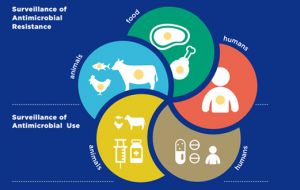MercoPress. South Atlantic News Agency
WHO, FAO and OIE call for responsible use of antibiotics in humans and animals
 Antibiotics are often overprescribed by physicians and veterinarians and overused by the public.
Antibiotics are often overprescribed by physicians and veterinarians and overused by the public.  Where they can be bought for human or animal use without a prescription, the emergence and spread of resistance is made worse.
Where they can be bought for human or animal use without a prescription, the emergence and spread of resistance is made worse.  To tackle these problems, WHO, FAO and OIE are leveraging their expertise and working together in a ‘One Health’ approach to promote best practices
To tackle these problems, WHO, FAO and OIE are leveraging their expertise and working together in a ‘One Health’ approach to promote best practices  “The overuse of antimicrobials blunts their effectiveness, and we must reduce their misuse in food systems,” says José Graziano da Silva, Director-General of FAO.
“The overuse of antimicrobials blunts their effectiveness, and we must reduce their misuse in food systems,” says José Graziano da Silva, Director-General of FAO. In the lead-up to World Antibiotic Awareness Week (13-19 November 2017), the Food and Agriculture Organization of the United Nations (FAO), the World Health Organization (WHO) and the World Organisation for Animal Health (OIE) are together calling for responsible use of antibiotics in humans and animals to reduce the emergence of antibiotic resistance.
Antibiotic resistance is rising to dangerously high levels in all parts of the world and threatening our ability to treat common infectious diseases. Infections affecting people – including pneumonia, tuberculosis, blood poisoning and gonorrhoea – and animals alike are becoming harder, and sometimes impossible, to treat as antibiotics become less effective.
Antibiotics are often overprescribed by physicians and veterinarians and overused by the public. Where they can be bought for human or animal use without a prescription, the emergence and spread of resistance is made worse. Examples of misuse include taking antibiotics for viral infections like colds and flu, and using them as animal growth promoters on farms or in aquaculture.
To tackle these problems, WHO, FAO and OIE are leveraging their expertise and working together in a ‘One Health’ approach to promote best practices to reduce the emergence and spread of antibiotic-resistant microbes in both humans and animals.
“Antibiotic resistance is a global crisis that we cannot ignore,” says Dr Tedros Adhanom Ghebreyesus, Director-General of WHO. “If we don’t tackle this threat with strong, coordinated action, antimicrobial resistance will take us back to a time when people feared common infections and risked their lives from minor surgery.”
“The overuse of antimicrobials blunts their effectiveness, and we must reduce their misuse in food systems,” says José Graziano da Silva, Director-General of FAO. “Antimicrobial veterinary medicines are a crucial tool for animal health and welfare and safe food production, but they are by no means the only tool.”
“Like in human health, veterinary medicine has tremendously progressed thanks to antibiotics. Preserving their efficacy and availability through their responsible use associated with good husbandry and prevention practices, is therefore essential to preserve animal health and welfare,” highlights Dr Monique Eloit, Director-General of OIE.




Top Comments
Disclaimer & comment rulesCommenting for this story is now closed.
If you have a Facebook account, become a fan and comment on our Facebook Page!